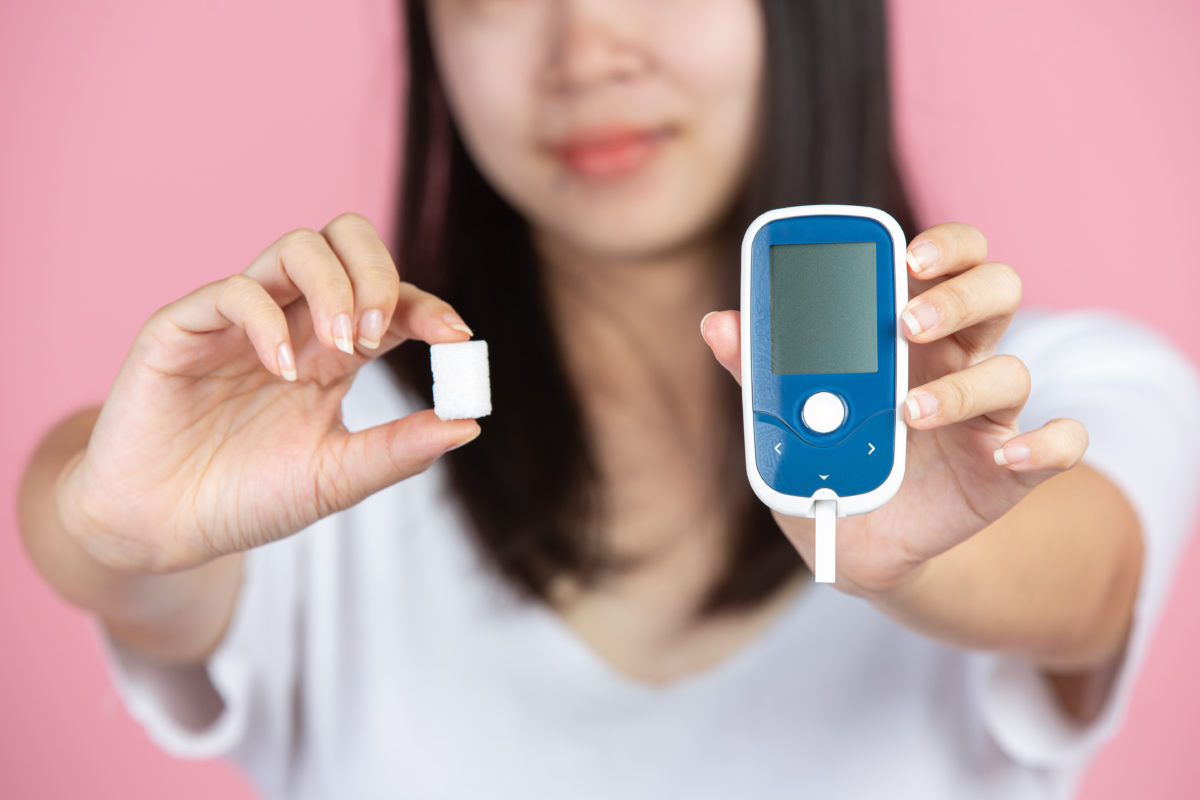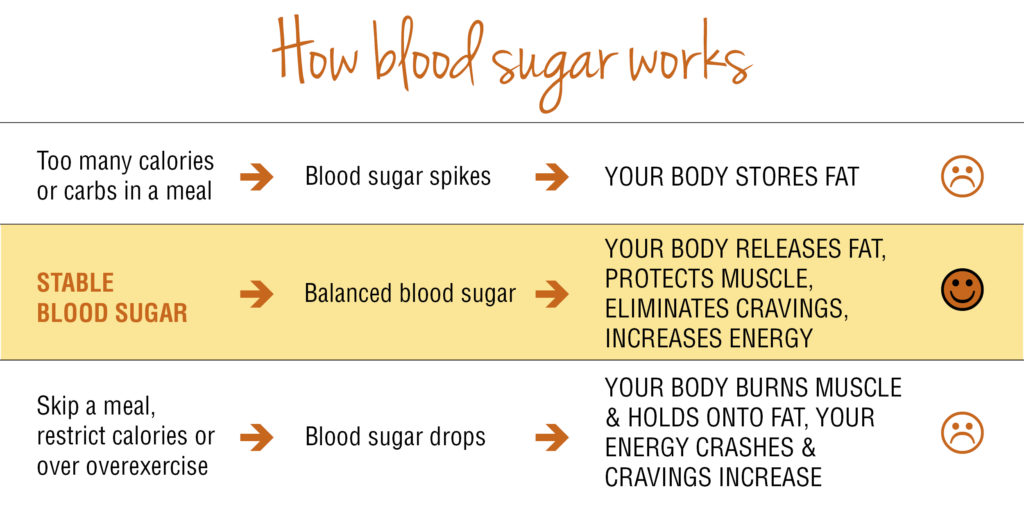
Insulin resistance has become a huge problem in our culture and it can lead to myriad of chronic health problems. Since insulin is a hormone, and all hormones communicate with each other, increased insulin levels disrupt every other hormone system in your body. When insulin isn’t doing its job, it’s nearly impossible to reduce the associated symptoms including; weight gain, difficulty losing weight, low energy levels, brain fog, food cravings, sleep issues, hot flashes, and night sweats. Hormones and blood sugar imbalances often go hand-in-hand, so read on about the signs and symptoms, and what you can do to fix the issues.
What is insulin?
Insulin is a hormone produced by your pancreas, and it plays an important role in metabolism. After you eat, your digestive system breaks down the foods you eat – mainly carbohydrates – into glucose, or sugar, which is then released into your bloodstream. With the help of the hormone insulin, glucose can absorb into the cells of your body to be used for energy or storage.
Insulin is also important because it stops sugar from accumulating in your bloodstream. The more you eat, the more insulin your body releases to regulate your blood sugar and keep it within a healthy range.
How does blood sugar relate to insulin resistance?
If our bodies are constantly over producing insulin to combat the effects of excess sugars, carbohydrates and stress, our cells stop responding, or become resistant to insulin. When this happens, too much sugar stays in the blood and builds up, instead of being used by our cells, which can lead to major health problems. If you have insulin resistance, your cells will have trouble absorbing this glucose, and your body will require more insulin to function properly.
In the United States, an estimated 32.2% of the population suffers from insulin resistance. Statistics report that more than 40% of individuals older than 50 years may be at risk for insulin resistance; however, it can affect anyone at any age.1 Many health experts also believe that insulin resistance has a major role in the development of the metabolic syndrome.2
Insulin resistance plays a significant role of other serious medical conditions as well, including obesity, hypertension, type 2 diabetes, dyslipidemia, cardiovascular disease, and even certain cancers.3 The growing obesity epidemic in the United States continues to escalate the number of individuals at risk for developing insulin resistance, even in children. Insulin resistance has also been linked to polycystic ovary syndrome (PCOS).4 Current studies suggest that 50% to 70% of women with PCOS have some degree of insulin resistance.5
Symptoms of insulin resistance:
- High blood sugar levels
- Fatigue, and sleepiness, especially after meals
- Brain fogginess and inability to focus
- Weight gain, fat storage, difficulty losing weight
- High blood pressure
- Increased cravings
Insulin resistance and the connection with hormones and blood sugar
Obesity, imbalanced hormones, unnecessary thyroid replacement therapy, over the counter and prescription drugs, lack of physical activity, chronic stress, lack of sleep, as well as an over consumption of sugars, carbohydrates, alcohol, and insufficient amounts of protein and fats all contribute to insulin resistance.
High insulin levels in women leads to increased testosterone which throws estrogen out of balance. Increased insulin also leads to increased adrenaline and cortisol levels, which will cause the body to deplete progesterone, leaving your body estrogen dominant. Progesterone helps to balance blood sugar as opposed to estrogen which over stimulates the pancreas. When the pancreas is being over stimulated by estrogen in the blood you can become insulin resistant, even if you are exercising and eating all the right foods – making it extremely difficult, if not impossible, to lose weight.
Ways to significantly improve or possibly reverse insulin resistance:
The good news is, insulin resistance may be reduced or even completely reversed with simple lifestyle measures. These include exercise, eating healthy, losing weight, quitting smoking, balancing your hormones and taking care of your sleep and stress levels.
- Lose weight
According to the Obesity Society, losing just 5 to 10 percent of your body weight can help prevent or delay the progression of type 2 diabetes. Clients on our Becoming Balanced weight loss program lose an average of 15-22 pounds* in just one month. Our program will not only help you lose weight, but with the assistance of our hormone balancing diet, supplements, relaxation program, and continual support, you will balance your blood sugar helping to improve your mood, sleep, and keep the weight off for good.
- Eat a blood sugar balancing diet
The glycemic index measures and ranks various foods by how much they cause blood sugar levels to rise. Research shows that following a low glycemic index diet decreases fasting blood sugar levels. Avoid or eliminate anything high on the glycemic index such as refined white sugar, white breads and pastas, soda, etc. Use fresh ingredients and avoid processed foods. When you fill your plate with colorful, whole foods that are minimally processed and low GI, they work to lower your blood sugar levels and avoid spikes. Some examples include: meats, fish, eggs, nuts & seeds, leafy greens, non-starch vegetables, apples, grapefruit, legumes, sweet potatoes, and quinoa. - Manage stress
When you’re under stress, your body produces higher amounts of cortisol. This hormone can make your muscles and cells resistant to insulin, resulting in higher blood sugar. Research shows that managing stress through meditation and exercise can also help to lower blood sugar levels. - Quit smoking
Giving up cigarettes may also reverse insulin resistance. Nicotine can cause your body to produce extra glucose, which makes it harder to control your blood sugar level. - Exercise
Exercise helps cells in your muscles take up more glucose to use it for energy and tissue repair while lowering blood sugar. Regular exercise also makes cells more responsive to insulin and helps prevent resistance. - Get your Zzz’s
A lack of sleep can raise stress and appetite hormones (cortisol and gherlin) that make you hungry and can have a similar effect to insulin resistance. Sleep helps reduce the amount of sugar in your blood. Getting adequate sleep each night is an excellent way to help keep blood sugar levels at a normal level. - Hydrate
Drinking enough water prevents dehydration and helps the kidneys remove extra sugar from the body in the urine. We recommend half your body weight in ounces. - Use our BeBalanced Natural Hormone Balancing creams
Until you balance your hormones and lower your stress levels, you will continue to have difficulties balancing your blood sugar even with diet and lifestyle changes. Our hormone balancing creams provide the building blocks your body needs to balance your hormones, your blood sugar,r and help you combat stress naturally without any negative side effects like synthetic hormone therapy. When your hormones and blood sugar are more balanced you will also notice an improvement in your mood, sleep, and energy levels.

Supplement your body with BeSteady
BeSteady is a professional grade supplement containing a unique blend of vitamins, minerals and herbs to support blood sugar levels and enhance fat burning. The extra support of BeSteady can help combat excess stress, heavy metals in the body, excess weight, while helping to maintain healthy blood sugar levels.
BeSteady contains: Thiamin, Niacin, Biotin, Chromium, Fenugreek Seed Extract, Bitter Gourd Extract, Gymnema sylvestre Extract, and Vanadium.
- Chromium and Vanadium are trace minerals that support blood sugar levels.**
- Fenugreek and Bitter Gourd have been long used to support blood sugar balance.**
- Gymnema sylvestre is a tropical plant that means “destroyer of sugar” that has been used in India to treat diabetes for over 2000 years.**
**These statements have not been evaluated by the Food and Drug Administration. This product is not intended to diagnose, treat, cure or prevent any disease.
You are not alone with hormones and blood sugar imbalances!
These lifestyle changes paired with the BeBalanced weight loss program and our hormone balancing supplementation can help prevent and even reverse insulin resistance, improving your mood, sleep, cravings, sleep, hot flashes/night sweats, and allow for efficient fat burning.
For more information about how Natural Hormone Balancing could help you live your best life, or to find out more about our programs, creams, supplements, and more, contact us today!
References:
- About diabetes. American Heart Association website. www.heart.org/HEARTORG/Conditions/Diabetes/AboutDiabetes/About-Diabetes_UCM_002032_Article.jsp. Accessed August 29, 2012.
- Mathur R. Insulin resistance and the use of metformin: effects on body weight. Bariatric Times. 2011;8(1):10-12.
- Olatunbosun ST. Insulin resistance. Medscape website. http://emedicine.medscape.com/article/122501-overview. Accessed August 30, 2012.
- Futterweit W. A Patient’s Guide to PCOS: Understanding and Reversing Polycystic Ovarian Syndrome. New York, NY: Henry Holt and Company; 2006.
- Polycystic ovary syndrome. United States Department of Health and Human Services website. www.nichd.nih.gov/publications/pubs/upload/PCOS_booklet.pdf. Accessed August 28, 2012.



